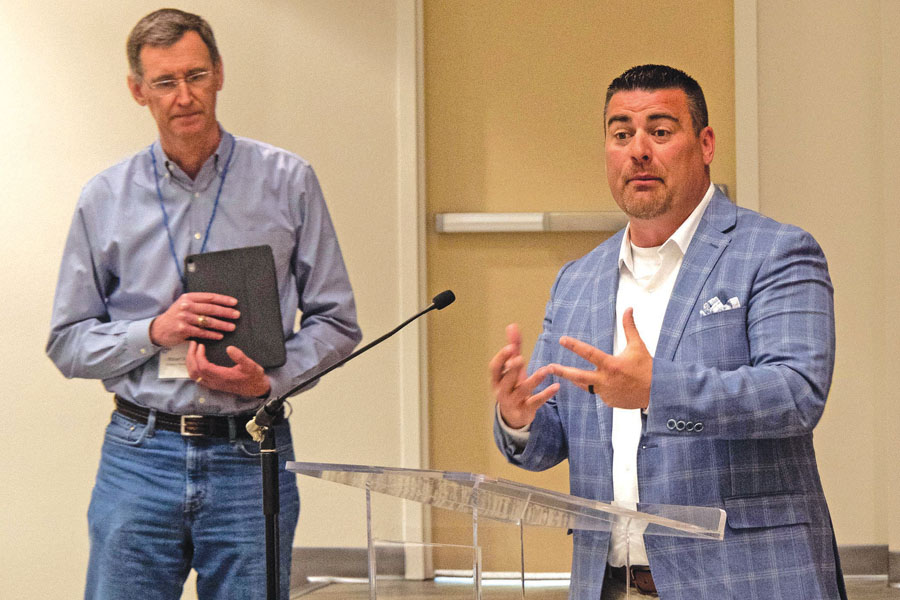
FORT WORTH, Texas (BP) – Nathan Lorick, SBTC executive director-elect, knows the challenges of sharing Christ in areas of the country lacking a wealth of Southern Baptist churches. He returned to the SBTC after serving more than three years as executive director of the Colorado State Baptist Convention. On April 20, Lorick proposed to the SBTC Executive Board a plan to endow a fund to help state conventions outside the South. The plan was approved.
“There was great joy in serving in a highly unreached area; there were also incredible challenges due to the lack of resources,” Lorick wrote in submitting the initiative for board consideration. “While our hearts wanted to see the gospel advance in unparalleled ways, often we didn’t have the people, partnerships or finances to support this goal.”
The approval of the revocable State Convention Ministry Endowment set in motion a strategic initiative whereby the SBTC will assist its sister state Southern Baptist conventions outside the South.
The endowment creates a funding mechanism to supply ongoing, board-approved ministry grants to qualified recipients who affirm the Baptist Faith and Message 2000. Funded with an initial $800,000 contribution from SBTC reserve funds, the endowment is expected to reach $3,000,000 with annual contributions, subject to the SBTC’s financial position. Once that level is reached, $150,000 per year would be available to invest in the ministries of sister conventions, including but not limited to church planting, evangelism and revitalization.
In addition to the endowment, the board approved a reserve fund grant of $200,000 to provide immediate grants to Baptist conventions outside the South.
Southern Baptist work in some parts of the country is relatively new since an agreement between Southern Baptists and American Baptists limited the work of Southern Baptists in the North and West until the middle of the 20th century. Those conventions generally have fewer and smaller churches than older conventions located in the South and Southwest. The SBTC historically has opened partnerships with cities and conventions outside the areas of greatest Southern Baptist strength in recognition of the great need.
The SBTC recently concluded a three-year partnership with the Montana State Baptist Convention that, although affected by the COVID-19 pandemic, proved very useful to the western convention. Barrett Duke, MTSBC executive director, said the partnership had been a big help to his convention’s churches.
Montana, like other non-South Southern Baptist state conventions, faces challenges because of its location outside the Bible belt. Duke enumerated a few of these issues, including the lack of a “deep institutional presence.”
“There just aren’t many other Baptist churches and no long legacy of Baptist work in western states,” Duke said, adding that the first Southern Baptist church in Montana started in 1952. Thus, even the oldest Baptist congregations are just coming out of their second generations.
“More than half of the SBC churches are not even 40 years old, and there are only 130 SBC churches in the whole state. Our churches are still more or less islands within their communities.”
Duke listed several areas where the MTSBC and similar non-South Baptist state conventions might find grants helpful, including the following:
- Facilitating outreach events in rural communities or on Indian reservations
- Assisting with building improvements: many plains churches were built quickly and economically; harsh winters take a toll on structures
- Enabling evangelism initiatives
- Supporting discipleship weekends for churches
- Church planting
Lorick, having recently led a non-South state convention, is looking to make an impact.
“I am excited that the SBTC will have the opportunity to come alongside non-South conventions in reaching their states with the gospel,” he told the TEXAN, “As we move forward, we will identify two or three conventions to begin strategic partnerships and seek to serve these conventions as they carry out their strategies. Through funding, equipping, and mobilizing SBTC churches to these states, we pray we’ll have the opportunity to see the Gospel advance like never before.”





















